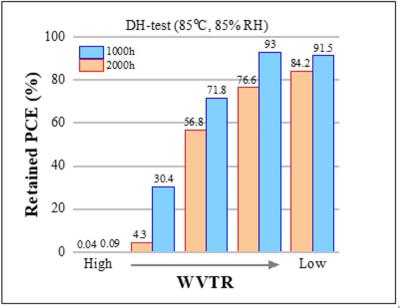Researchers from Japan's Ritsumeikan University and Sekisui Chemical have studied the role of barrier films in shielding flexible perovskite solar modules from harsh environmental conditions.
The research team utilized PSC modules made of methylammonium lead iodide (MAPbI₃), which were encapsulated with polyethylene terephthalate substrate with barrier films of varying water vapor transmission rates (WVTR). The PSC modules were subjected to a damp heat test, which utilized exposure of the modules to 85 °C temperature and 85% relative humidity. The conditions were set to simulate real-world outdoor conditions over extended periods.
After 2,000 hours of exposure, the photovoltaic (PV) performance of the modules was recorded, and the degradation of the modules was confirmed through characteristics of current voltage, spectral reflectance, and electroluminescence.
The researchers found that high humidity led to the decomposition of the MAPbI₃ layer into lead iodide, blocking the charge transport across layers. This degradation led to a significant reduction in the efficiency of the PSC modules highlighting the detrimental impact of moisture on the PSC performance.
In addition, the findings revealed that the quality of the barrier film played a critical role in the module’s stability. Notably, the module with the lowest WVTR barrier of 5.0 × 10⁻³ g/m²/day retained 84% of its power conversion efficiency. However, the modules with higher WVTR experienced rapid degradation, ceasing to function after just 1,000 hours.
This study highlights the importance of barrier films in maintaining the long-term durability and stability of flexible PSC modules.




